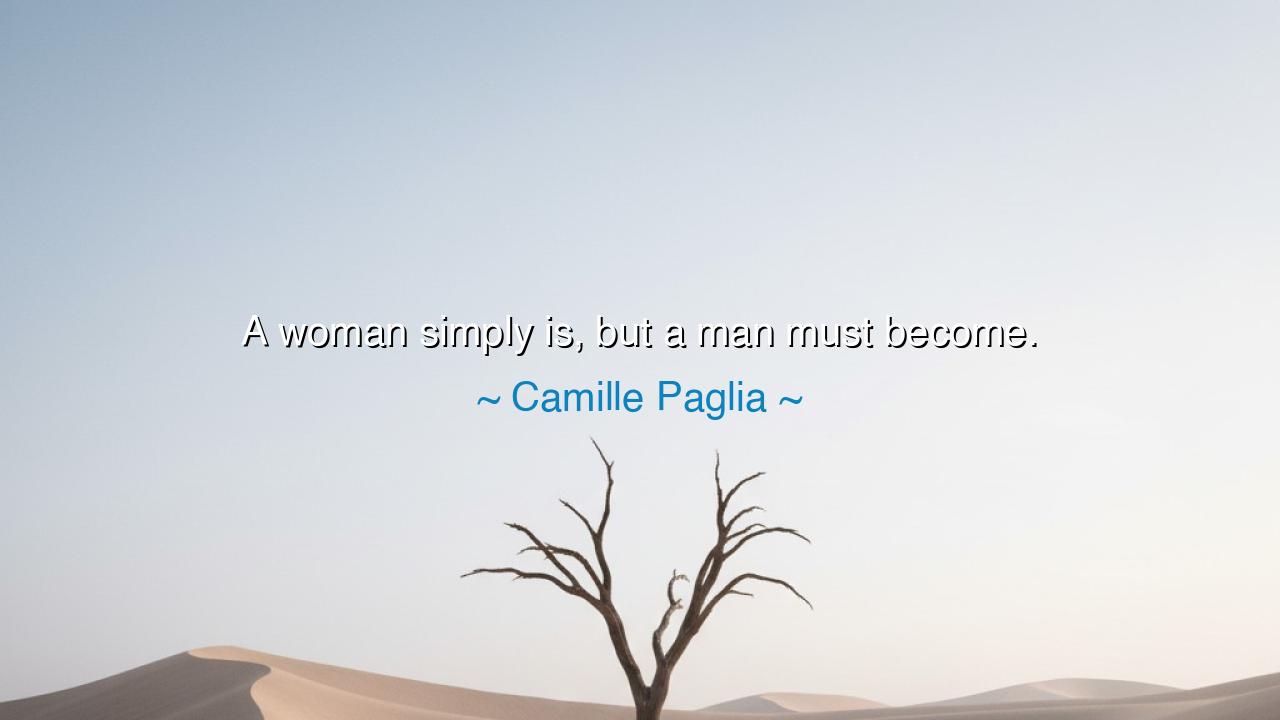
A woman simply is, but a man must become.






When Camille Paglia said, “A woman simply is, but a man must become,” she spoke not only of gender, but of the eternal rhythms of human existence. In these words lies a profound meditation on essence and effort, on nature and nurture, on the differences in how life calls men and women to fulfill their destinies. The woman, in Paglia’s view, carries a completeness in her being — an innate presence that is recognized and revered. The man, by contrast, is shaped through trial, ambition, and striving; he must forge himself through action, courage, and experience. This distinction, she suggests, is not a hierarchy, but a reflection of life’s ancient design: the essence of woman is, the essence of man is becoming.
The ancients understood the resonance of such a truth. In Greek thought, women were often associated with nature, continuity, and the eternal cycles of life, while men were linked with culture, conquest, and the shaping of destiny. Aeschylus and Sophocles portrayed heroines whose presence commanded the narrative, whose being shaped events through will and essence. Men, however, were often tested through deeds, quests, and trials, earning honor through struggle and action. Paglia’s words echo this age-old understanding: women are the living foundation upon which life rests; men are those who must climb, wrestle, and carve themselves into heroes.
Consider the example of Joan of Arc, whose essence — courage, intuition, and inner fire — inspired armies and changed the course of history. She simply was resolute, and her presence alone shaped events. Contrast her with Alexander the Great, who, though born into privilege, had to wrest himself into legend through campaigns, conquests, and countless acts of daring. He became through effort; she was through being. Paglia’s observation reminds us that the paths to influence differ: one through innate presence, the other through deliberate transformation.
This quote also invites reflection on human society and its expectations. Women, by their essence, often exert influence simply through being recognized and understood; men, by contrast, are frequently measured by what they achieve, by how they transform themselves and the world. This is not a limitation, but a challenge — a call to men to embrace the labor of becoming, to meet life with courage and discipline. In doing so, they find not only status, but self-realization. Essence and action converge in the theater of life, each shaping destiny in complementary ways.
Paglia’s insight also speaks to personal growth and understanding. For a man to “become” is to confront his fears, cultivate virtue, and test his limits. To fail in this pursuit is natural, for becoming is arduous, requiring both discipline and vision. Women, in contrast, carry the power of being in their presence and engagement, influencing the world by embodying completeness rather than by performing heroic deeds. Both paths are necessary; both are sacred. The harmony of society depends on recognizing these distinct yet complementary rhythms of existence.
History provides many illustrations. Socrates spent his life questioning, testing, and refining his soul and mind, a man continually becoming through inquiry and trial. Aspasia of Miletus, by contrast, exerted profound influence through her presence, her intelligence, and her insight — she simply was, and the world around her responded. Paglia’s observation is a reminder that greatness manifests differently, shaped by essence in women and by effort in men, yet both can be transformative.
The lesson is universal: men must embrace their call to become, facing life’s trials and shaping themselves with courage, integrity, and action. Women, while naturally commanding presence, must also nurture their essence consciously, recognizing the power that lies in simply being. To understand this duality is to comprehend the balance of human society, and the intertwined destinies of men and women across time.
So, O listener, carry Paglia’s wisdom into your life: honor the essence of women, and respect the becoming of men. Strive as a man to forge your soul and deeds; recognize as a woman the potency of your being. In this duality, life’s grand design unfolds: the world moves forward through action and essence, through the complementary powers of becoming and being, shaping a tapestry that endures across generations.






AAdministratorAdministrator
Welcome, honored guests. Please leave a comment, we will respond soon